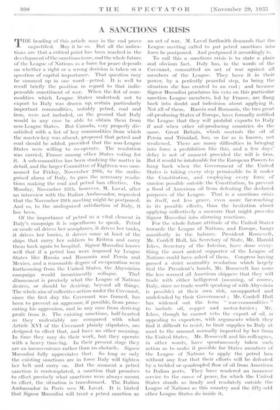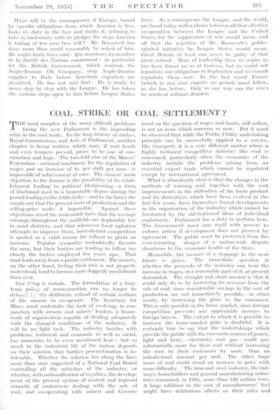A SANCTIONS CRISIS
THE heading of this article may in the end prove unjustified. May it be so. But all the indica- tions are that a critical point has been reached in the development of the sanctions issue, and the whole future of the League of Nations as a force for peace depends on whether a right or a wrong decision is taken on a question of capital importance. That question may be summed up in one word--petrol. It is well to .recall briefly the position in regard to that indis- pensable constituent of war. 'When the list of com- modities which League States undertook not to export to Italy was drawn up, certain particularly important commodities, notably petrol, coal and iron, were not included, on the ground that Italy would in any case be able to obtain them froth non-League States. But Canada, very properly dis- satisfied with a list of key commodities from which the master-key was absent, proposed that petrol and coal should be added, provided that the non-League States were willing to co-operate. The resolution was carried, France among other States voting for it. A sub-committee has been studying the matter in detail, and the larger Committee of Eighteen was sum- moned for Friday, November 29th, to the undis7 guiscd alarm of Italy, to pass the necessary resolu7 tions making the coal and petrol ban effective. On Monday, November 25th, however, M. Laval, after an interview with the Italian Ambassador, requested that the November 29th meeting might be postponed. And so, to the undisguised satisfaction of Italy, it has been.
Of the importance of petrol as a vital element in Italy's campaign it is superfluous to speak, Petrol or crude oil drives her aeroplanes, it drives her tanks, it drives her lorries, it drives some at least of the ships that carry her, soldiers to Eritrea and carry them back again to hospital. Signor Mussolini knows well that if a petrol ban were imposed by League States like Russia and Rumania and Persia and Mexico, and a reasonable degree of co-operation were forthcoming from the United States, the Abyssinian campaign would incontinently collapse. That denouement is precisely what the League of Nations desires, or should be desiring, beyond all things. The whole aim of collective action under the Covenant, since the first day the Covenant was framed, has been to prevent an aggressor, if possible, from prose- cuting his aggression, and in any case from deriving, profit from it. The existing sanctions, half7hearted as they undeniably are compared with what•
Article XVI of the Covenant plainly stipulates, are designed to effect that, and have no .other meaning.
In time they may do their work, but they operate with a heavy time-lag. In their present stage they are an inconvenience rather than an obstacle. Signor Mussolini fully appreciates that.. So long as only the existing sanctions are in force Italy will tighten her belt and carry on. But the moment a petrol
sanction is contemplated; a sanction that promises to effect precisely what sanctions were always meant to effect, the situation is transformed, The Italian. Ambassador in Paris sees M. Laval. It is hinted that Signor Mussolini will treat a petrol sanction as
an act of war. M. Laval forthwith demands that the League meeting called to put petrol sanctions into force be postponed. • And postponed it accordingly is.
To call this a sanctions crisis is to state a plain and obvious fact.. Italy has, in the words of the Covenant, committed an act of war against all members of the League. • They have it. in their power, by a perfectly peaceful step, to bring the .situation she has created to an end ; and because Signor Mussolini proclaims his veto on this particular sanction League members, led by France, are • flung back into doubt and indecision about applying it. Not all of them. Russia and Rumania, the two great oil-producing States of -Europe, have formally notified the League that they will prohibit exports to Italy if and when Other oil-producing countries do the same. Great Britain, which controls the oil of Persia and .Trinidad, has, so far as is known, not weakened. There are many difficulties in bringing into force a prohibition like this, and a few days' delay is not of moment provided the will is firm. But it would be intolerable for the European Powers to hang back when the Government of the United States is taking every step permissible to it under the Constitution, and employing every form of suasion possible outside the Constitution, to prevent a flood of American oil from defeating the declared purposes of the League. That is a sanctions crisis in itself, not less grave, even more . far-reaching in its possible effects, , than the hesitation about applying collectively a measure that might provoke Signor Mussolini into alarming reactions.
• For the whole future attitude of the United States towards the League of Nations, and Europe, hangs manifestly in the balance. President Roosevelt, Mr. Cordell Hull, his Secretary of State, Mr. Harold Ickes, Secretary of the Interior, have done every- thing the most ardent supporter of the League of Nations could have asked of them. Congress having passed a strict neutrality resolution which largely tied the President's hands, Mr. Roosevelt has none the less warned all American shippers that they will trade with either belligerent (meaning, of course,. Italy, since no trade worth speaking of with Abyssinia is possible) at their own risk, unsupported and undefended by their Government ; Mr. Cordell Hull
has widened out the term war-commodities 7, to include oil, copper . and motor-lorries ; Mr. Ickes, though lie .cannot veto the export of oil, is appealing to exporters, with arguments which they find it difficult to resist, to limit supplies to Italy at most to the amount normally imported by her from the United States. Mr. Roosevelt and his colleagues, in other words,. have spontaneously taken such action as to make it possible for States members of the League . of Nations to apply the petrol ban. without any fear that their efforts will be defeated. by a trebled or quadrupled flow of oil from American to Italian ports. They have rendered an immense service to the cause of peace, for which the United States stands as firmly and resolutely outside the League of Nations as. this country and the fifty-odd other League States do' inside it, What will be the consequences if Europe, bound by specific obligations from which America is free, looks its duty in the face and shirks it, refusing to take in conformity with its pledges the steps America is taking of her own free will ? Mr: Roosevelt has done more than could reasonably be asked of him. lie might fairly have said : Que messieurs les menibres de la Societe des Nations commencent ; • in particular let the •British Government, which controls the Anglo-Iranian Oil Company, stop Anglo-Iranian supplies to Italy before. -American exporters are Penalised. IIe has not said that. He is ready to move step by • step with the League. He has taken the various steps open to him before League States have. As a consequence the League, and the world, Are faced today with a choice between all that effective co-operation between the League and the United States for the suppression of war would mean, and all that the rejection of Mr. Roosevelt's public- spirited initiative by League States would mean. Great Britain at least can never be guilty of that great refusal. More of leadership than we aspire to has been thrust on us at Geneva, but we could not repudiate our obligations in September and we cannot repudiate them now. In the last resort France (which in any case exports no 'petrol) must follow, as she has before. Only in one way can the 'criss be resolved without disaster.













































 Previous page
Previous page